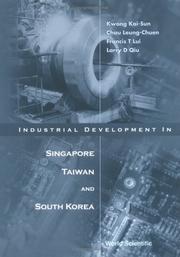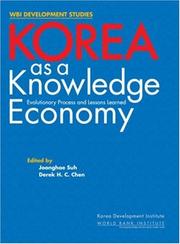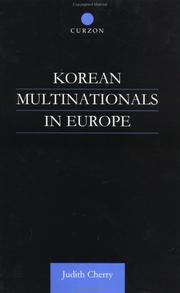| Listing 1 - 4 of 4 |
Sort by
|

ISBN: 9810246277 9786611951603 1281951609 9812810064 9789812810069 9781281951601 9789810246273 Year: 2001 Publisher: New Jersey : World Scientific,
Abstract | Keywords | Export | Availability | Bookmark
 Loading...
Loading...Choose an application
- Reference Manager
- EndNote
- RefWorks (Direct export to RefWorks)
Economic analysis of the industrial experiences of the newly industrialized economies in Asia is generally lacking in the literature. This study attempts to fill that void by providing an in-depth discussion on the economic impact of the industrial policies of Singapore, Taiwan, and South Korea in the three-and-a-half decades after 1960. Throughout the study, a broad perspective of macroeconomic development is maintained. It is highly critical of the narrow-minded objective of certain governments in maximizing the pace of industrialization at the expense of general economic well-being.
Electronic books. -- local. --- Industrialization -- Korea (South). --- Industrialization -- Singapore. --- Industrialization -- Taiwan. --- Industries -- Korea (South). --- Industries -- Singapore. --- Industries -- Taiwan. --- Industrialization --- Economic History --- Business & Economics --- Industries --- Industrial development --- Economic development --- Economic policy --- Deindustrialization
Book
ISBN: 9782130830504 2130830501 Year: 2022 Publisher: Paris : PUF,
Abstract | Keywords | Export | Availability | Bookmark
 Loading...
Loading...Choose an application
- Reference Manager
- EndNote
- RefWorks (Direct export to RefWorks)
De la musique de BTS à la série Squid Game, une vague de produits culturels sud-coréens déferlent sur le monde et surprend par l'engouement qu'elle suscite. K-pop, K-drama, K-films, mais aussi bandes dessinées (manwhas), c'est ce que l'on désigne comme la Hallyu (mot chinois passé dans la langue courante pour indiquer la vague sud-coréenne de produits culturels). Cet ouvrage expose à quel point cette nouvelle vague culturelle est le fruit d'un écosystème politique et économique spécifique. Faisant suite à la domination anglo-saxonne et japonaise dans la pop culture des générations précédentes, elle constitue une forme de globalisation alternative. Se penchant sur le cas de la réception française (particulièrement intéressant à analyser car il ne peut être imputé à des proximités culturelles préexistantes, la diaspora sud-coréenne étant quasi inexistante en France et les liens historiques entre les deux pays ténus), l'ouvrage met en évidence une caractéristique des jeunes générations : une ouverture à l'altérité culturelle, où l'esthétique règne en maître, et dont les effets façonnent l'image de ce qu'est une modernité positive, une société désirable, une identité valorisée
Cultural industries - Korea (South) - History - 21st century --- Culture diffusion - Korea (South) - History - 21st century --- Popular culture - Korea (South) - History - 21st century --- Korea - Civilization - 21st century --- Cultural industries --- Culture diffusion --- Popular culture --- History --- Korea --- Civilization

ISBN: 0821372017 9786611000981 1281000981 0821372025 9780821372012 Year: 2007 Publisher: Washington, D.C.: World bank,
Abstract | Keywords | Export | Availability | Bookmark
 Loading...
Loading...Choose an application
- Reference Manager
- EndNote
- RefWorks (Direct export to RefWorks)
Korea's development process offers valuable lessons for other developing and less developed economies. In particular, the way Korea uses outside technologies, by accumulating indigenous capabilities, is still valid in the era of the knowledge economy. This volume examines the Korean model and Korea's march toward a knowledge economy from a poverty-ridden economy before the launch of full-scale industrialization in the early 1960's. It also emphasizes Korea's achievements, as well as remaining tasks within the four pillars of the knowledge economy, with a common theme throughout -- how Korea has
High technology industries -- Korea (South). --- High technology industries. --- Knowledge management -- Korea (South). --- High technology industries --- Knowledge management --- Knowledge economy --- Business & Economics --- Economic History --- Korea (South) --- Economic policy --- Management of knowledge assets --- Taehan Minʼguk --- Han guo --- Dae Han Min Kuk --- Tae Han Min Guk --- Daehan-Minʼguk --- South Korea --- Tai Han Min Kook --- South Korean Interim Government --- S.K.I.G. --- SKIG --- Nam Chosŏn Kwado Chŏngbu --- Namjosŏn --- Namjosŏn Kwado Chŏngbu --- Republic of Korea --- Da Han Minguo --- Daehan Min-kuk --- Daikan Minkoku --- ROK --- 대한민국 --- 大韓民國 --- 대한 민국 --- Daehanminguk --- Management --- Information technology --- Intellectual capital --- Organizational learning --- Industries --- USAMGIK --- United States Army Military Government in Korea --- High technology industries - Korea (South) --- Knowledge management - Korea (South) --- Korea (South) - Economic policy - 1960 --- -High technology industries --- Ȯmnȯd Solongos --- Emu̇nedu̇ Solungus --- Solongos (South) --- Solungus (South) --- Bu̇gd Naĭramdakh Solongos Uls --- Bu̇gu̇de Nayiramdaqu Solungus Ulus --- I︠U︡zhnai︠a︡ Korei︠a︡ --- Южная Корея --- Korei︠a︡ (South) --- Корея (South) --- BNSU --- БНСУ

ISBN: 0700714804 9780700714803 Year: 2001 Publisher: Richmond, Surrey: Curzon,
Abstract | Keywords | Export | Availability | Bookmark
 Loading...
Loading...Choose an application
- Reference Manager
- EndNote
- RefWorks (Direct export to RefWorks)
Investments, Korean --- Corporations, Korean --- Household electronics industry --- International business enterprises --- Investissements coréens --- Sociétés coréennes --- Appareils électroniques domestiques --- Entreprises multinationales --- Industrie --- Investments, South Korean --- Electronic industries --- -Investments, South Korean --- -Electronic industries --- -K9462 --- Electronics industry --- Electric industries --- South Korean investments --- Business enterprises, International --- Corporations, International --- Global corporations --- International corporations --- MNEs (International business enterprises) --- Multinational corporations --- Multinational enterprises --- Transnational corporations --- Business enterprises --- Corporations --- Joint ventures --- Korea (South) --- -Korea: International trade and economic relations (South) Korea -- Europe --- Investissements coréens --- Sociétés coréennes --- Appareils électroniques domestiques --- K9462 --- Korea: International trade and economic relations (South) Korea -- Europe --- International business enterprises - Korea, South --- Investments, South Korean - Europe --- Electronic industries - Korea, South --- Electronic industries - Europe --- Household electronics industry - Korea --- Household electronics industry - Europe --- International business enterprises - Korea
| Listing 1 - 4 of 4 |
Sort by
|

 Search
Search Feedback
Feedback About UniCat
About UniCat  Help
Help News
News